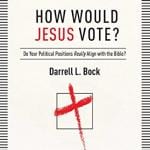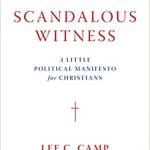Tremper Longman III
The Bible and the Ballot: Using scripture in Political Decisions
Grand Rapids, MI: Eerdmans, 2020.
Available at Eerdmans.
The Bible and the Ballot proposes how to use Scripture in think about contemporary American political discussions. Christians regularly invoke the Bible to support their positions on many controversial political topics—gay marriage, poverty, war, religious liberty, immigration, the environment, taxes, etc.—and this book tries to work through several of those difficult topics. Tremper Longman – well-known evangelical OT scholar – provides the hermeneutical scaffolding for thinking about politics with the Bible. Longman offers some preliminary remarks about interpretation and then proceeds topic by topic, citing and analysing relevant Scriptures, noting the attitudes and dispositions one should have, then concluding with enduring principles for consideration. He is clear that the Bible gives principles not specific policies.
I appreciate the reason why Longman wrote this book: “We live in turbulent times. No matter where you are in the political spectrum, you must acknowledge the divisiveness and vitriol and partisanship that threaten our national and human unity. Because of this, our political rhetoric has become caustic. Each side demonizes the other. Unfortunately, many Christians have participated in name-calling and attempts to shame and humiliate the other side” (xii-xiii). Totes agree with that sentiment, Christians need to pay attention to just what they are arguing for but how they are arguing about it.
Longman’s book has a good introductory section on Christ vis-a-vis culture, and an intro to biblical interpretation, esp. looking at the locus of meaning in author, text, and reader – very good section! Then Longman talks about a redemptive-trajectory model in the style of William Webb that I’d also recommend. He also includes some key biblical themes that should always be at the back of our minds as we reach individual passages, themes like the image of God, redemption, consummation, wisdom, idolatry, and more. Thereafter, Longman addresses 10 contentious topics including: nationalism/globalization; religious liberty; war; abortion; criminal justice; immigration; same-sex marriage; environment; poverty; and racism.
On abortion – a difficult topic – he makes some wise comments:
Many antiabortion advocates in the United States focus on overturning Roe v. Wade as the goal of their activism. Those who believe abortion is murder have no other recourse. However, due to the nature of the American system of law, overturning Roe v. Wade would not end the practice of abortion in America. If the US supreme Court were to hold that hte Constitution does not prohibit bans of abortion, overturning Roe, it would then be up to individual states or the federal government to set abortion policy. Many states would opt to permit abortion. … This suggests that eliminating abortion completely through a legal mechanism is not feasible.
I agree. I recognize that abortion is not a black and white topic and it has several layers of moral complexity, but my sympathy is always to defend the life of the voiceless and vulnerable, including the unborn. That said, my whole Christian life I’ve heard American conservatives say that Whitehouse appointments through SCOTUS was the ONLY way to defeat Roe v. Wade. Well, we’ve had Reagan, Bush, Bush, and Trump and you are still no closer to overturning Roe. Instead of trying to change SCOTUS, they need to change the culture, and people’s hearts. Longman puts it wisely:
In the final analysis, then, while Christians should keep upholding the sanctity of life and protesting abortion as an infringement on that sanctity, we should not put our trust in the law, but in the power of persuasion to the gospel and to obedience. And, in the meantime, there may be wisdom in making abortion rare and safe.
While Longman’s remarks might look like a capitulation to the pro-abortion movement, it is far, far away from the current progressive mantra of abortion for any reason, at any time in pregnancy, without apology.
On same-sex marriage, Longman is also I think quite right:
Due to the clarity on the subject, the church should honor the biblical teaching on sexuality, heterosexual and homosexual, in its thinking and its practice [I’d add a lot of footnotes that this point – MFB]. But that does not speak to the issue of public policy. While Christians may desire that the society in which it lives reflects values that they think would lead to people’s flourishing, they should not be surprised or anxious when the broader society does not follow biblical principles in the area of sexuality. While resisting the state’s encroachment on the church’s own practice, the church should not try to impose its sexual ethic on the state, particularly when the state has normalized same-sex marriage as a constitutional right. After all, the Bible also prohibits adultery, but Christians are not advocating for adultery laws. That the state agrees with the church (at least at the moment) by forbidding incest or polyamorous marriages is a happy convergence of values, but again, the principle operative here si that God wants Christians to follow his will for their lives. He wants non-Christians to have a relationship with him, not simply to act like Christians. Thus, it may be a matter of wisdom to approach this question through persuasion rather than through legislation.
I think that is probably wise advise.
Otherwise, a very good read, and I found myself mostly agreeing with it.












